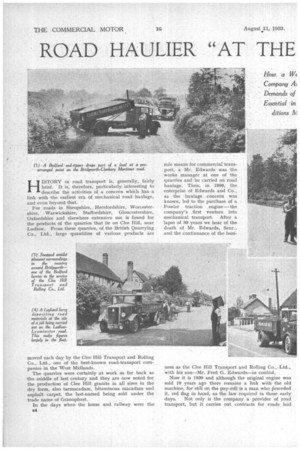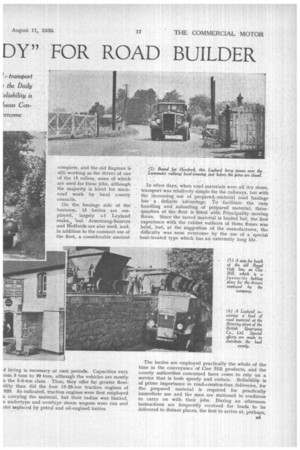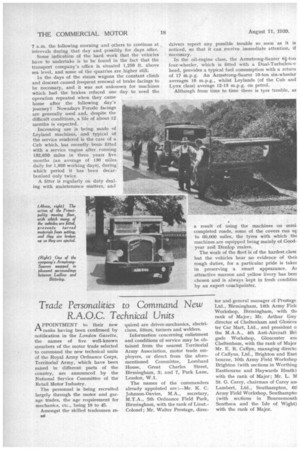ROAD HAULIER "AT THE DY" FOR ROAD BUILDER
Page 38

Page 39

Page 40

If you've noticed an error in this article please click here to report it so we can fix it.
How a 144 Company A1 Demands of Essential in ditions N
transport r the Daily 'enabling is !uous Con)ercome H'STORY in road transport is, generally, fairly brief. It is, therefore, particularly interesting to describe the activities of a concern which has a link with the earliest era of mechanical road haulage, and even beyond that.
For roads in Shropshire, Herefordshire, Worcestershire, Warwickshire, Staffordshire, Gloucestershire, Oxfordshire and elsewhere extensive use is found for the products of the quarries that lie on Clee Hill, near Ludlow. From these quarries, of the British Quarrying Co., Ltd., large quantities of various products are moved each day by the Clee Hill Transport and Rolling Co., Ltd., one of the best-known road-transport companies in the West Midlands.
The quarries were certainly at work as far back as the middle of last century and they are now noted for the production of Cleo Hill granite in all sizes in the dry form, also tarmacadam, bituminous macadam and asphalt carpet, the last-named being sold under the trade name of Granophast.
In the days when the horse and railway were the sole means for commercial transport, a Mr. Edwards was the works manager at one of the quarries and he carried on road haulage. Then, in 1890, the enterprise of Edwards and Co., as the haulage concern was known, led to the purdhase of a Fowler traction engine -the company's first venture into mechanical transport. After a lapse of 30 years we hear of the death of Mr. Edwards, Senr., and the continuance of the busi ness as the Clee Hill Transport and Rolling Co., Ltd., with his son—Mr. Fred G. Edwards—in control.
Now it is 1939 and although the original engine was sold 19 years ago there remains a link with the old machine, for still on the pay-roll is a man who Preceded it, red flag in hand, as the law required in those early days. Not only is the company a provider of road transport, but it carries out contracts for roads laid complete, and the old flagman is still working as the driver of one of the 15 rollers, some of which are used for these jobs, although the majority is hired for mainroad work by local county councils.
On the haulage side of the business, 15 lorries are employed, largely of Leyland make but Armstrong-Saurers and Bedfords are also used, and, in addition to the constant use of the fleet, a considerable amount
A hiring is necessary at rush periods. Capacities vary rota 3 tons to PO tons, although the vehicles are mostly
n the 5-6-ton class. Thus, they offer far greater flexiAlity than did the four 15-20-ton fraction engines of 920. As indicated, traction engines were first employed n carrying the material, but their radius was limited, o undertype and overtype steam wagons were run and Iter eplaced by petrol and oil-engined lorries.
In other days, when road materials were all dry stone, transport was relatively simple for the railways, but with the increasing use of preparect material road haulage has a definite advantage. To facilitate the easy handling and unloading of prepared material, threequarters of the fleet is fitted with Principality moving floors. Since the tarred material is loaded hot, the first experience with the rubber surfaces of these floors was brief, but, at the suggestion of the manufacturer, the difficulty was soon overcome by the use of a special heat-treated type which has an extremely long life.
The lorries are employed practically the whole of the time in the conveyance of Clee Hill products, and the county authorities concerned have come to rely on a service that is both speedy and certain. Reliability is of prime importance in road-construction deliveries, for the prepared material is required for practically immediate use and the men are stationed in readiness to carry on with their jobs. During an afternoon instructions are frequently received for loads to be delivered to distant places, the first to arrive at, perhaps, 7 a.m. the following morning and others to continue at intervals during that day and possibly for days after. Some indication of the bard work that the vehicles have to undertake is to be found in the fact that the transport company's office is. situated 1,250 ft. above sea level, and some of the -quarries are higher still.
In the days of the steam wagons the constant climb and descent caused frequent renewal of brake facings to be necessary, and it was not unknown for machines which had the brakes refaced one day to need the operation repeated when they came home after the following day's journey! Nowadays Ferodo facings are generally used and, despite the difficult conditions, a life of about 12 months is expected.
Increasing use is being made of Leyland machines, and typical of the service rendered is the case of a Cub which, has recently been fitted with a service engine after running 132,650 miles in three years five months (an average of 130 miles daily for 1,020 working days), during which period it has been decarbonized only twice.
A fitter is regularly on duty dealing with maintenance matters, and
drivers report any possible trouble so soon as it is noticed, so that it can receive immediate attention, if necessary.
In the oil-engine class, the Armstrong-Saurer four-wheeler, which is fitted with a Dual-Turbulence head, provides a typical fuel consumption with a return of 17 m.p.g. An Armstrong-Saurer 10-ton six-wheeler averages 10 m.p.g., whilst Leylands (of the Cub and Lynx class) average 12-13 m.p.g. on petrol.
Although from time to time there is tyre trouble, as a result of using the machines on semicompleted roads, some of the covers run ur to 60,000 miles, the tyres with which the machines are equipped being mainly of Goodyear and Dunlop makes.
The work of the fleet is of the hardest class but the vehicles bear no evidence of theii rough duties, for a particular pride is taker in preserving a smart appearance. As attractive maroon and yellow livery has beer chosen and is always kept in fresh conditior by an expert coachpainter.












































































